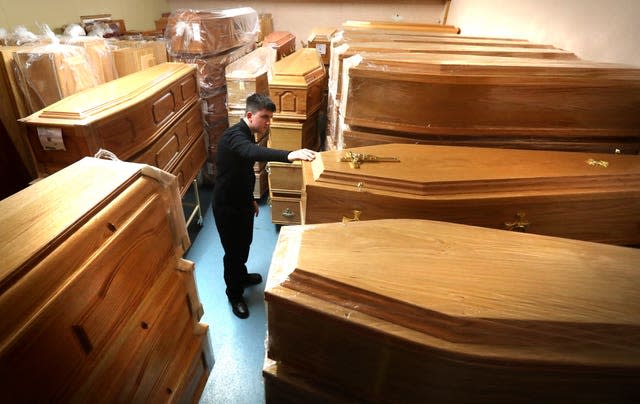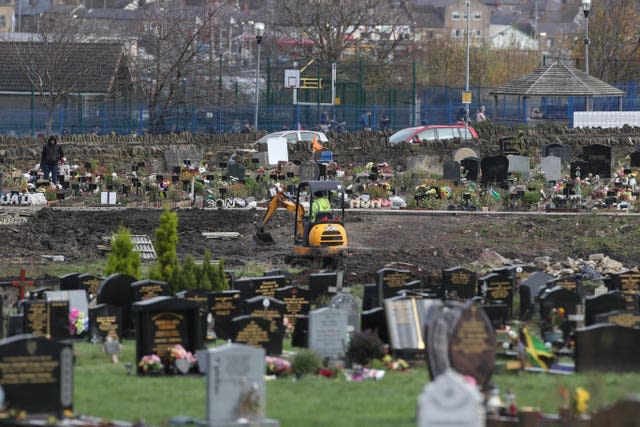More than 900 people dying a day on average in first two weeks of 2021
More than 900 people died with coronavirus on average every day in the UK in the first two weeks of 2021, figures show.
The last time the UK saw a 15-day period that was so deadly was in the last half of April 2020, and the number is likely to increase as more deaths are registered.
The findings coincide with the first anniversary of the UK’s earliest known death involving Covid-19, which took place on January 30 2020.
One year on, the UK’s Covid-19 full death toll, including all mentions of coronavirus on death certificates, has passed 120,000.
Analysis by the PA news agency of data published by the Office for National Statistics (ONS) shows how the second wave of the virus has developed so far.

The first wave saw 50,000 deaths reached on May 23, two months after the UK locked down for the first time.
It took a further six months for the UK Covid-19 death toll to pass 75,000 on November 26.
But it then took just six weeks for the death toll to pass 100,000 on January 7.
At least 13,876 people have died with Covid-19 up to January 15, the latest date for which ONS data is available.
All figures are based on the date deaths took place, not when they were reported.
While the first wave saw deaths rise sharply to its daily peak, in the current wave deaths have increased over a longer period of time.
Experts have said the UK remains in “a very difficult position”, with fears that this wave could prove more deadly than the first.
Karl Friston, professor of imaging neuroscience at University College London, and panellist on the Independent Sage group, said the total number of deaths is “likely to far exceed the number seen during the first wave”.
And he said the rate at which deaths decline is likely to be slower and fluctuate.
He said: “In short, it seems as if the current resurgence will, on the one hand, not attain the peak fatality rates of the first wave; however, it is likely to be more protracted and deadly.
“The actual trajectory will depend sensitively on sociobehavioural responses (eg opening schools) and the efficacy of vaccination.”
A year on from the first known death, hundreds of people are becoming newly bereaved every day and there are hundreds of thousands more facing the first anniversary of the loss of a loved one.
Hospice UK estimates more than 600,000 people will be dealing with the impact of losing a loved one, based on an average of five people being bereaved per death.
The Government’s preferred measure of Covid-19 deaths in the UK, based only on people who died within 28 days of testing positive, has just passed 100,000.
But the wider death toll, based on mentions of Covid-19 on death certificates plus deaths known to have occurred more recently, is now over 120,000.
Imogen Thomas, Dying Matters campaign manager for Hospice UK, said: “During the past year, we’ve witnessed the most death for more than a generation, leaving many people lost and mourning.

“Taking into consideration social distancing measures and lockdowns, people have not been able to come together to grieve, causing huge amounts of damage to emotional wellbeing.
“While there is no right or wrong way to grieve, we want people to know there is help out there.
“It may not be easy to talk about death, but it matters.
“By remembering and talking about the people we have lost, we can support one another at an incredibly difficult time.”
The Marie Curie charity said the UK is “navigating mass bereavement amid ongoing tragedy”.
It is calling for March 23 – the day the UK first entered lockdown – to be a national day of reflection for the millions of people bereaved since the pandemic began.
Louise Bowen, Covid bereavement co-ordinator at the Marie Curie hospice in Newcastle, said: “With chances to say goodbye stolen away and vital social connections broken, we are seriously concerned about the pandemic’s legacy of complex, unresolved and long-lasting grief.
“There are people experiencing multiple bereavements, whole communities disproportionately affected, and overwhelmed healthcare professionals witnessing death on unimaginable scales.”
The Sue Ryder charity said demand for free video counselling more than doubled in 2020 compared to the previous year.
Its online bereavement community, which offers peer-to-peer support for those who are grieving, saw an increase of 47% in visitors year on year.
Bianca Neumann, head of bereavement at Sue Ryder, said: “The coronavirus pandemic has meant that for many people, they have been unable to spend time with someone who is dying and may have experienced a more unexpected or distressing bereavement.
“The combination of economic pressures and social distancing restrictions may mean that people who have been bereaved feel stuck, unable to engage in activities that may have helped with their feelings of grief.”
She added: “Marking the anniversary of someone’s death is personal to you, yet it is very easy to get caught up in the expectations and pressure of how the day should be.
“Everyone deals with bereavement differently and there are no right or wrong ways to grieve.”

 Yahoo Sport
Yahoo Sport 





































